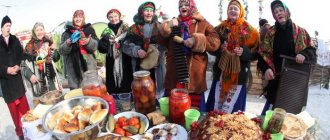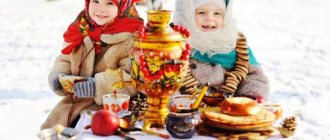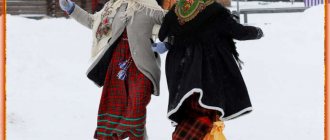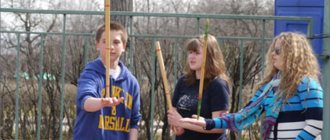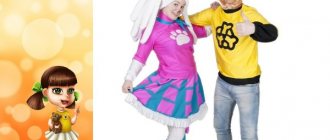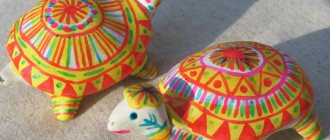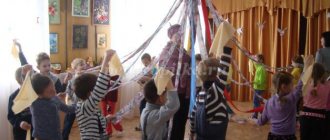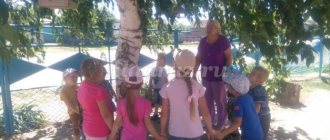Maslenitsa outdoor games
The ancient Slavs believed that if you spend the entire Maslenitsa week boringly, then there will be no luck next year. And having had a lot of fun during the holidays, you can already do a good job. That is why in Rus' there were so many games and fun dedicated to Maslenitsa. It is imperative to tell preschoolers about this and invite them to organize a holiday on the eve of spring. This can be done on the street. At the same time, the predominant entertainment will be outdoor games so that the children do not freeze.
You can invite your parents to such an outdoor celebration. It’s good to ask them in advance to prepare some holiday attributes for the children: for example, for girls - scarves in the Russian folk style, for boys - masks or unusual hats. It will be great if the teacher dresses up in an appropriate costume that matches the color of the holiday, for example, transforms into Spring (a green sundress over outerwear, a wreath with flowers and ribbons).
If the teacher puts on a costume that matches the color of the holiday, the children will be delighted
"Carousel"
Traditionally, the carousel game was played during Maslenitsa festivities. To do this, a high pole was installed in the square, to which long multi-colored ribbons were attached. The kids grabbed them and ran around.
This kind of fun can be arranged in the kindergarten area. The short pole can be held and rotated by an adult. You can also use a hoop (ribbons are tied to it); again, the teacher stands in the center and rotates it.
When the children start running, the adult turns the pole in the right direction.
The rules of the game can be very different depending on the age of the children. For kids, it will be enough to move at different paces according to the words of the famous song (pronounced by an adult):
- Barely, barely, barely The carousel spun, And then, then, then, All running, running, running. Hush, hush, don't rush, Stop the carousel, One-two, one-two, The game is over.
For older children, the rules can be complicated. Preschoolers run in a circle to the tune of a Russian plus melody (you can take speakers outside) or to the beat of a tambourine. When the music stops, each child must grab the end of the ribbon (before that they do not touch them). At the same time, there is one less ribbon than there are children: the child left without a ribbon is eliminated. Then the game continues until there are two participants and one ribbon left (each time one is untied from the pole or hoop).
Video: "Carousel" game in kindergarten"
This game can be played with kids both indoors and outdoors. In the latter case, the accompaniment can be a tambourine, and the song is sung by children and adults in chorus.
"Burners"
You should definitely offer the kids traditional Maslenitsa burners. At the beginning of the game, children form a “stream” - they stand in pairs in a column, take hold of the handles and lift them.
Maslenitsa burners will amuse the children, like their peers many centuries ago
The couple standing at the very end runs forward in a “corridor” under clasped arms. When all the pairs have run in this manner, the children sing in chorus the song “Burn, Burn Clear!”:
- Burn, burn clearly, so as not to go out! Look at the sky, Birds are flying, Bells are ringing: - Ding-dong, ding-dong, Run out quickly!
After this, the couple standing in front scatters to the sides, and the driver (let it be an adult for the first time) tries to catch one of these guys. If the children managed to run to the end of the column and hold hands again, then the next pair will run away. If one of the participants is caught, then he becomes the driver (the previous one takes his place).
The game “Burners” is more suitable for older preschoolers, as it requires a certain dexterity and speed.
"Trap"
On Maslenitsa, you can also play games familiar to children, but they must be given a festive flavor. For example, in the game “Trap” the driver is dressed up as a goat.
You can add a Maslenitsa flavor to familiar games, for example, by dressing the driver as a goat
The goat (or goat) is a traditional Slavic mummering character. The costume of this animal (a wooden head with horns, a beard made of straw, a casing turned outward with wool) was worn during Christmas and Shrovetide rounds. This animal was considered a symbol of fertility and a rich harvest. Sometimes they even brought a live goat to Maslenitsa.
Participants turn to the “goat”:
- Little gray goat, little white tail, We'll give you something to drink, We'll feed you, Don't butt us, But play Trap.
After the last words, the players scatter around the court, and the “goat” tries to catch up with someone.
Maslenitsa fights
What would Maslenitsa be without fist fights? Only in kindergarten this game needs to be made safer: participants do not fight with fists, but use balloons in the shape of sticks (you can even make swords). Participants stand on a bench and strike each other, trying to knock down the opponent.
Traditional fist fights should be made safer
Competition "Snowdrops"
Since Maslenitsa is also a meeting of spring, you can use the symbol of this time of year, for example, a snowdrop, in the game. You will need quite a lot of artificial flowers (they can be made in advance with the children during the lesson), or again they can be made from long balloons. Preschoolers are divided into two or three teams. Music plays while an adult scatters snowdrops in the snow. As soon as the melody stops, the teams begin to collect flowers. The winner is the owner of the largest bouquet.
Preparing for the holiday is also a holiday, so older preschoolers will be happy to make snowdrops with their own hands
"Masha the Confused"
Children form a long “chain” - holding each other by the shoulders or waist. The driver stands first and starts running around the area in different directions. The players’ task is not to break the “chain” and not fall (the most difficult thing is for the children standing at the end). When someone falls, they are out of the game.
Video: fragments of the Maslenitsa holiday in a kindergarten on the street
Games and fun indoors
Much more often, the Maslenitsa holiday in kindergarten is held in the music room. Various games and fun are also held here, but, of course, they are calmer than on the street.
The acoustics in the room are better, so musical games are more successful - children sing songs themselves (to the accompaniment of the music director).
Round dance games
It is good to perform various round dance games while listening to music. After all, the round dance is associated with the sun and pancakes - the main symbols of Maslenitsa. It is imperative to draw children's attention to this similarity.
The round dance symbolizes the sun and looks like a pancake - children should definitely learn about this
In the round dance game itself, you must also use holiday attributes, for example, cut out pancakes, a sun, a Maslenitsa doll, etc.
In the round dance game you need to use the symbols of the holiday
"Golden pancake"
Children form a circle. Together with the teacher and music director, they sing a song:
- Oh, damn golden! You'll go around in circles, you'll find a friend, you'll start a round dance! Masha, come out into the circle, start a dance, And we will clap, and we will trample! Oh, damn it, golden, dance with me, You are rosy, you are good, you look like the sun! Oh, damn golden! You'll go in circles.
Simultaneously with the singing, a cardboard pancake is passed around in a circle. The child who finished the song comes to the center and performs dance moves to the music. Then he bows, returns to the round dance again, and the game repeats.
"Kostroma"
A driver is appointed - “Kostroma”, he stands in the center. The rest of the guys move in a round dance, holding hands and talking with “Kostroma” to the accompaniment of music:
- “Kostroma, Kostroma, my lady! Kostromushka has jelly with pie, Kostromushka has pie with cottage cheese!” Are you healthy Kostroma? Kostroma: “Great!” Children: “Where were you, Kostoroma?” Kostroma: “On the river!” Children: “What have you seen, Kostroma?” Kostroma: “Sulfur the duck!” Children: “What are you doing now?” Kostroma: “I’m catching you now!”
After this, the children run away (the round dance “scatters”), and “Kostroma” tries to make someone look bad. The caught child becomes the driver himself.
"Round dance with a scarf"
Preschoolers should also be offered the traditional Maslenitsa round dance game using a handkerchief. Maslenitsa (an adult in the appropriate outfit) stands in the center of the circle and says the words:
- And I am Maslenitsa, I am not a stepdaughter, As soon as I go with a handkerchief, I’ll come up to you now! There is a scarf on my shoulder, whoever runs faster will take the scarf from me and call spring to us!
The children say the chant (at the same time they walk in a circle):
- Come spring, come spring! We will all have trouble sleeping! Please come soon! Feed us all with bread!
The round dance stops, Maslenitsa stands in front of the two kids and points at them with a scarf. The guys stand with their backs to each other and, according to the signal, run in a circle in opposite directions. The winner will be the one who runs faster and manages to take the handkerchief from Maslenitsa’s hands.
Of course, to play you need to use a scarf with a Russian national ornament
“Making pancakes”
You can offer the children a fascinating round dance dramatization. The host offers to bake delicious pancakes:
- To make the stove hot, you need to light a fire in it - the children represent it with loud applause.
- Now you need a frying pan. It is round, so you need to hold hands (preschoolers form a round dance). The frying pan should be heated hotter - the children dance to the sounds of a quadrille (the leader demonstrates the movements).
- Pancakes are good to eat with jam. The presenter asks what kind of jam the kids like and offers raspberry jam - the guys again take hands and run in a circle to the song “Let's go through the raspberries into the forest.”
- Pancakes can also be eaten with caviar. You need to apply it, and more of it - all the participants in the round dance are twisted into one huge ball (in a spiral, with an adult walking in front).
- The presenter reports that the pancakes turned out nice, beautiful, and rosy. Preschoolers walk in a circle to music, first in one direction, then in the other, pretending to be pancakes.
To heat up the frying pan hotter, the kids dance a mischievous square dance
After such a dance, it would be ideal to arrange a tea party with pancakes for the children at the tables.
Maslenitsa fun
Fun is not as dynamic as games. These could be improvisation tasks, creative competitions, poetry reading competitions, and riddle guessing competitions. Parents of preschool children can be actively involved in all this if they are present at the holiday.
"Skomoroshki"
For younger preschoolers, the fun “Skomoroshki” is suitable. Kids put on buffoon hats with bells and perform various tasks: they dance, show how a bear, a goose, a cockerel, a bunny, a fox walk, a goat butts, the sun rolls across the sky, etc.
Kids put on buffoon hats and perform different tasks - dance, show how a bear, a goose walks, etc.
"Cast iron"
Fun is already appropriate for older preschoolers. You will need a grip and a cast iron (just not a heavy one). The task of each participant is to carry it along the specified route (for example, a circle) without dropping it. This is not as easy as it seems at first glance.
It turns out that carrying a cast iron pot without dropping the lid is not so easy
"Goat-dereza"
This is fun for children of all ages. The teacher takes out the Goat, a Russian folk amulet doll, and asks the children what nursery rhyme they know about the goat. The guys, of course, begin to say “There comes a horned goat...”. At the end of the nursery rhyme, the adult “butts” the most serious and upset child with a goat.
The goat should cheer up the most serious child - “gore” him
"Panicle"
Children stand in a row and pass each other a broom decorated with satin ribbons, paper flowers, spikelets, etc. All this happens to a fast melody. When the music stops, the broom is in someone's hands. This child will have to guess a riddle, recite a poem or sing a ditty about Maslenitsa.
Whoever has a broom in his hands must complete a task, for example, sing a ditty about Maslenitsa
"Mail»
This is a Russian dialogue game that children must learn in advance:
- Presenter: Knock-knock! Children: Who's there? Host: Mail! Children: Where from? Host: Out of town! Children: What are they doing in the city? Presenter: clap your hands!
After the last words, the guys begin to clap their hands. Then the game starts again, only after the words “What are they doing in the city?” another task is given (they can be very different, very funny, for example, stand on one leg).
"Pancakes - flatbreads"
This is a fun and playful shouting game where there are no winners and losers. The guys are divided into two teams: one should shout “pancakes” in unison when given a signal, the other should shout “flat cakes” (children always love this). The proposed text is as follows:
- It was a good winter, we are seeing it off and joyfully welcoming the warmth of spring. We bake pancakes with seasoning (hand sign in the direction of “pancakes”)! And delicious (hand sign towards “flatbread”) flatbreads! We clap our hands cheerfully and together (everyone clap). The long-awaited oil week has arrived, and no one can count how much we ate. We ate and ate (hand sign) pancakes! And also (hand sign) flatbreads! Now let’s spin around ourselves a little (everyone is spinning). There are songs, dances, laughter, noisy festivities all around, In every house the efforts and efforts were appreciated, There are pancakes on the table (hand sign)! And next to it (hand sign) are flatbreads! To get more into us, we jump on our legs (everyone jumps). Another circle around us (everyone is spinning), And we clap our hands (everyone is clapping).
Fun related to drawing
The symbols of Maslenitsa can be played out in creative tasks related to drawing. For example, you can use the following options:
- "Sun". On each of the two sheets of whatman paper there is a sun drawn without rays. Preschoolers are divided into teams, each standing approximately 5 meters from their drawing, each given one yellow marker. At the signal, the guys run to their sheets one by one and complete the rays (each participant draws one ray). The team that finishes first will win.
- “Bake your own pancake.” Just a creative task without competition. Each preschooler is given a frying pan cut out of black cardboard, to which a yellow circle is glued - the silhouette of a pancake. The child must draw (with pencils or felt-tip pens) his own exclusive pancake. At the end of creativity, all pancakes are hung out for everyone to see.
The sun on whatman paper needs to be made unusual and funny
Pancake quiz for parents
So that parents (if they are present at the holiday) do not get bored, you should involve them in dancing, and also offer a special “pancake quiz”. For each question there are 4 possible answers:
- What holiday in Rus' was called pancake eater? (Easter, Maslenitsa , Christmas, New Year) (Other names: obezhukha, zhiroedha, obirukha, deceiver).
- What do pancakes symbolize for Maslenitsa? ( sun , moon, stars, planets).
- What kind of flour were traditional Russian pancakes made from in the old days? (wheat, rye, buckwheat, rice).
- What was the name in Rus' for pancakes in which any food was baked? (with offspring, with heat , with background, with a saying).
- What are reduced pancakes called? (donuts, pancakes , dumplings, dumplings).
- What kind of pancakes do skilled housewives bake? ( openwork , quilted, embroidered, dimensionless).
- Insert the missing word into the Russian proverb: “A pancake is not a wedge, ... it will not split” (log, glass, belly , head.), (A pancake is not a wedge, it will not split its belly).
- Who in the fairy tale by K.I. Chukovsky’s “Confusion” put out the fire with pies and pancakes? (chanterelles, whale, crocodile , bear).
- Which fairy-tale character put forward the pancake theory of the origin of lunar craters? (Carlson, Znayka , Ivan the Fool, Emelya).
- Which athletes have gloves called pancakes? ( Boxers , skiers, fencers, lugers). (These are lightweight boxing training gloves.)
- What is the name of a sports equipment with pancakes? (Spear, pole, barbell , hammer). (These are metal discs.)
- In which region of Russia was a monument to the pancake erected? ( Ulyanovsk , Tambov, Voronezh, Ivanovo).
Video: Maslenitsa holiday in kindergarten (parents are present, a lot of round dancing games)
Video: holiday at the preschool educational institution “Broad Maslenitsa” in the middle group (held in the music room, games, dances, songs and fun are demonstrated)
The bright and cheerful Maslenitsa always warms and unites both children and adults. Children from kindergarten should be instilled with the good tradition of cheerfully celebrating this holiday. A variety of games and fun can be offered to children both outdoors and indoors. The main thing is to focus on the national color and main symbols of Maslenitsa.
Entertainment "Maslenitsa" for children of the middle group in kindergarten. Scenario
Entertainment script “Maslenitsa, come to us, bring Spring!”
for children of middle preschool age Author: Chalova Tatyana Anatolyevna, teacher of the MADOU kindergarten “Solnyshko”, town. Kamensk, Republic of Buryatia. Description: Maslenitsa has long been loved in Russia - a cheerful, mischievous holiday. At this time, they said goodbye to winter, burned an effigy of Winter and glorified Spring. This holiday symbolized people's hopes for a fruitful and fruitful year, so Maslenitsa was always very satisfying. At the center of the holiday was Maslenitsa - a figure, a doll made of straw, which was dressed up in a caftan, a hat, put on bast shoes, rode on a sleigh, and sang songs. People referred to her as a long-awaited and dear guest - “honest, broad, cheerful; noblewoman Maslenitsa, Mrs. Maslenitsa."
Purpose of the material: I bring to your attention a scenario for entertaining children of middle preschool age “Maslenitsa”. This material may be useful to educators, additional education teachers, and music directors. Goal: increasing children's cognitive interest in national holidays and traditions of their people. Objectives: to form in children an understanding of the traditions of celebrating Maslenitsa; instill in children an interest in folk games and entertainment; to cultivate in children love and respect for the traditions and customs of the Russian people. Preliminary work: conversation, guessing riddles, memorizing sayings, chants about Maslenitsa, watching the presentation “Hello Maslenitsa”, playing folk games “Rucheyok”, “Lady”, etc. Equipment : easels, whatman paper, felt-tip pens, stand with ribbons, handkerchiefs Characters : children, presenter - Matryoshka, brownie Kuzya. Progress of the entertainment: A Russian folk melody sounds, children (in Russian costumes) enter the hall in pairs, where they are met by Matryoshka and play the folk game “Stream”.
The round dance game “Stream” is an ancient ritual game that symbolized the melting of snow. The sun warmed the earth, the snow melted, and babbling brooks ran everywhere. You need to stand in pairs, hold hands and raise them up to form a stream. To the music, Matryoshka enters the stream and takes a mate. The one who is left alone is the one who drives, choosing whoever he wants. So the stream runs on and on. And along with this running, spring is approaching. (Children after the game stand in a semicircle) Matryoshka:
Hello, hello, have fun and joy! Today we are saying goodbye to winter, serving pancakes, inviting spring to us! Who can say what we call this holiday? Children: Maslenitsa!
Matryoshka: that's right guys, this is Maslenitsa - a fun, mischievous holiday. At this time, they say goodbye to winter, burn an effigy of Winter and glorify Spring. Since ancient times, Maslenitsa has been called by affectionate names: wide, cheerful, honest, Yasochka, killer whale, gourmet. Matryoshka: and back in the old days, they called for Maslenitsa and Spring with chants so that the warmth would come faster. Let's do this too, let's shout out chants
Calls: 1.child: Spring! Spring is red! Warm sunshine! Come quickly, warm the children! 2.child: Little sun, shine it, look out! The sparrows are chirping, the red spring is calling, drops are falling from the roof, the sandpipers have arrived! 3.child: Larks, quails, swallows! Come and visit us! Bring us a clear spring, a red spring! 4.child: “Maslenitsa, Maslenitsa! Maslenitsa came to visit us, Maslenitsa brought happiness! Maslenitsa, Maslenitsa, take away the winter, Maslenitsa, Maslenitsa, Spring come to us!” Matryoshka: and now I would like to clarify with you. What do they bake on Maslenitsa?
That's right, pancakes! Let's get into a round dance and sing about pancakes! (children and Matryoshka dance in a circle)
Song: “We haven’t eaten pancakes for a long time” 1. We haven’t eaten pancakes for a long time, We wanted pancakes. Chorus: Oh, pancakes, pancakes, pancakes, Gilded circles! 2. Here we are meeting Maslyana, making cheese and butter. Chorus: 3. As we started the dough, we baked a whole mountain. Chorus: 4. Spread the pancakes with more oil to make them tastier. Chorus: 5. As clear as oil in the house, Hello, Maslenitsa is red. Chorus: (children sit down) Matryoshka: well, now, my little friends, we will play together and bake pancakes! Whichever team bakes the most wins! Competition “Who can bake the most pancakes?” Children form two teams of 5 people, when given a signal, run in line to the easel and draw pancakes with a marker. Matryoshka: now let’s play chant Shout with movements “Like Maslenitsa” Children share. The girls, at a signal from Matryoshka’s right hand, shouts: “Pancakes!” boys at the left hand signal: “Have fun!” After these words, movements are performed that are specified in the chant. Like a week of oil Every day in the morning we ate... What? Pancakes! Enjoy! Around yourself with a jump! At lunch they drank tea, threw handfuls into our mouths... What? Enjoy! Pancakes! Bow for Winter! Well, at dinner, as always, the best food for us... What? Pancakes! Enjoy! Stand with your right side to the stage! We visited our mother-in-law and chewed all day... What? Enjoy! Pancakes! Bow for Spring! All insults were forgiven and oil was poured on... What? Pancakes! Enjoy! Around yourself with a jump! Matryoshka: One, two, three, four, five, I really want to dance. I invite my matryoshka girlfriends. Let's glorify Maslenitsa and dance merrily. The girls are dancing the “Matryoshka” dance. The music is playing, Kuzya the brownie flies into the hall on a broom.
Kuzya: dear little broom, stop, that’s enough, I’ve already swooped in! (gets off the broom).
-Where did this broom take me?
Oh! Oh! Oh! There are so many of you! Yes, everyone is rosy, cheerful, smart, Hello! To all of you. And chavoy, are you all gathered here? Did you recognize me? (children answer) Matryoshka: we celebrate Maslenitsa, we welcome Spring. Where are you from, Kuzya? And where did you lose your mommy Yagulechka? Kuzya: I ran away from Baba Yaga. She froze me, I can’t wait for spring. I completely exhausted her; there was no cleaning or appliances in her hut on chicken legs. The stove won’t heat, the porridge won’t cook, oh, bad, bad. But I respect order, I love to eat delicious food. And how I like to celebrate Maslenitsa. Can I stay with you in your kindergarten, I will keep order, I will help your cooks, cook porridge, bake pancakes for the children. Matryoshka: well, don’t we mind, stay and celebrate Maslenitsa with us. Kuzya: but you probably don’t know how to bake pancakes, what you need to add to the dough so that they become tasty, sweet, rosy. Matryoshka: and now we’re learning this from our guys Word game “Pancakes”
Those who know the ingredients of the pancakes quickly answer me yes or no. Fresh milk - yes! Head cabbage - no! Chicken egg - yes! Pickled cucumber - no! Jellied meat - no! Sugar and salt - yes! White beans - no! Flour, yes soda - yes! Salted fish - no! Bay leaf - no! Ghee - yes! Kuzya: Well done guys, you made me happy. Matryoshka: Kuzya, listen to what poems our guys know about pancakes. Poems: 1.child: Hello, Maslenitsa! Give us butter! We'll bake ourselves some hot pancakes - We don't care about snowstorms and frosts! If there is a frying pan, We are not afraid of the cold, Because the pancake is hot - This is the best food! 2.child: Five eggs, a glass of flour Butter, a cup, two hands. Soda, salt and milk - The mixer turns easily. He spun and spun - the pancake turned out thin. In the heat, in the heat, and with honey - We are waiting for you to visit in the evening. 3. child: We have pancakes with potatoes, and we have pancakes with cloudberries, sour cream and jam - they’re just delicious! Place the pancake in your mouth and wash it down with sweet tea. We have to eat golden brown pancakes all week! And our grandmothers will bake us pancakes! 4. child: Early one morning Kuzya took a frying pan, kneaded the dough in a bowl, and poured milk into it. And then I baked pancakes, both fragrant and delicious. Round, ruddy, honey and spicy, rich, pretty, like the sun. Kuzya: thank you guys, you even know poems about me. I like it so much! Matryoshka: Maslenitsa has come to us, And we are saying goodbye to winter, We are welcoming Spring.
Let's start a round dance and sing about spring.
Song “Hello, Spring is red” Matryoshka: we will continue to glorify Maslenitsa and have fun playing. And you, Kuzya, play with us. Musical game "Lady" with handkerchiefs. Children pass several handkerchiefs in a circle to the music. After the music stops, those with handkerchiefs in their hands go to the center of the circle and perform dance movements based on the Matryoshka display. Children standing in a circle clap. Matryoshka: on Maslenitsa people not only dance and sing, but also organize competitions and ride on carousels and sleighs.
Kuzya: Who wants to ride a horse? Competition "Horse Racing"
Matryoshka: The glorious month of March is walking across the earth. Today we are opening the solar carousel. Game "Carousel" (to Russian folk melody)
Grab your ribbons, We've had a ride - stop, It's time to rest, The game is over! Kuzya: we guys celebrated Maslenitsa well, but it’s time to recognize the honor! Matryoshka: it’s time to say goodbye and treat yourself to pancakes. And the guys in the group were waiting for pancakes. Come with us, Kuzya, to drink tea and pancakes. Goodbye, Maslenitsa, come again! In a year we will meet Beauty again. Let's celebrate again and serve pancakes! Kuzya: thank you guys for the invitation, for the fun Maslenitsa, but I just felt sorry for my grandmother Yagusya, how she was there alone, she probably lost me. I’ll fly to her, ask for forgiveness, bake pancakes, we’ll continue to live with her, and make good money! Kuzya flies out of the hall. Matryoshka and the children go into a group to drink tea and pancakes.
We recommend watching:
Scenario for the Maslenitsa holiday. Middle and senior group Project in the middle group on the theme of Maslenitsa Leisure with parents and children of the middle group on Maslenitsa. Scenario Scenario of entertainment for children of the junior - middle group in kindergarten. Maslenitsa
Similar articles:
Scenarios for Maslenitsa in kindergarten
Theatrical game in the middle group for Maslenitsa indoors
Maslenitsa. Scenario for kindergarten
Farewell to the Russian winter, or Maslenitsa. Script for children
Crafts for Maslenitsa in kindergarten step by step with photos. Preparatory group
